
Amazon GCC certification + UL4200A report
On September 21, 2023, the U.S. Consumer Product Safety Commission (CPSC) decided to adopt UL4200A-2023 (Product Safety Standard for Button Cell Batteries or Coin Cell Batteries) as the mandatory consumer product safety rule for consumer products containing button cells or coin cells. The relevant requirements were also incorporated into 16 CFR 1263.
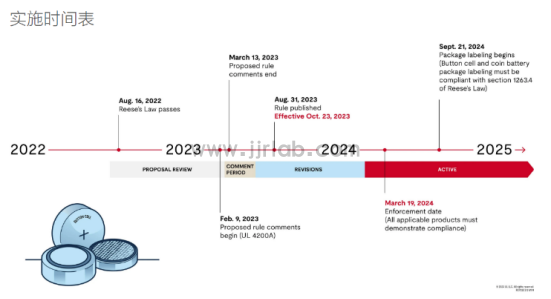
1. Button battery UL4200A report application process
1. Project application:
Submit UL report application to China JJR LAB.
2. Document preparation:
According to the standard requirements, the enterprise shall prepare relevant certification documents.
3. Product testing:
Send the samples to be tested to JJR laboratory, and engineers will test the samples.
4. Prepare report:
Engineers will prepare reports based on qualified test data.
5. Submit for review:
Engineers will review the complete report.
6.Issuance of certificate:
After the report is reviewed and approved, a UL test report will be issued.
2. Detailed introduction of UL4200A report for button batteries
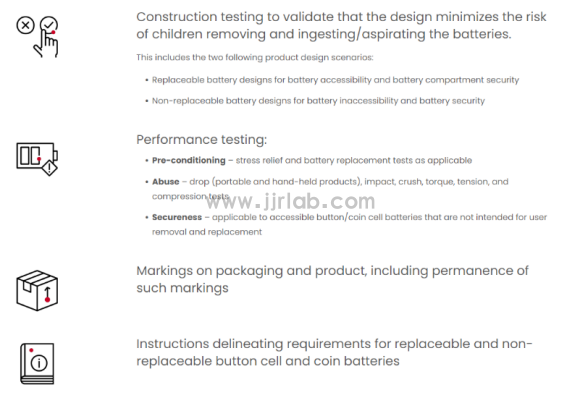
UL4200A makes systematic requirements for products containing button batteries in terms of structure, testing, warning labels (product body and packaging), instructions, etc.
product structure
1. For terminal products with "batteries that can be removed or replaced by the user", the structure must meet the following requirements: ①
The test probe No. 11 of IEC61032 shall not contact the battery. The housing that can be opened without the help of tools, or the housing that can be opened by hand in less than two independent and continuous movements, shall be opened for evaluation during the inspection process.
② The product needs to be designed as follows to prevent children from moving the battery:
the battery cavity can only be opened with the help of tools (such as screwdrivers, coins), at least 0.5Nm and a minimum rotation angle of 90 degrees to open the battery cavity, or the fastener should engage at least two complete threads;
or when using hands, at least two independent and combined movements are required to open the cover or door of the battery cavity.
③ If the cover or door of the battery cavity is fixed by screws or similar fasteners, the fasteners must be limited to the cover or door, such as captive screws.
2. When a product is equipped with a "battery that is not intended to be removed or replaced by the user", it is necessary to effectively prevent users or children from removing it. The product must be designed to:
① Make the battery inaccessible through the casing or similar means;
② Or completely fix the battery by welding, rivets or similar means.
Test items
UL4200A test items
: Pretreatment
, drop test
, impact test
, rolling test
, torque test
, tensile test
, compression test
, installation firmness test (for batteries that cannot be moved or replaced by users)
3. Labeling requirements
All warning words or icons shall be prominent, clear, easily recognizable under normal conditions, and permanently marked. Label permanence tests are as follows:
· The test is conducted by rubbing the mark by hand for 15s with a cloth soaked in water without noticeable force and by rubbing it for 15s in different places or on different samples with a cloth soaked in petroleum ether. Petroleum ether is a reagent grade hexane with a n-hexane content of at least 85%.
· The marking shall remain legible after each test. If the marking is on a detachable label, the label shall not appear to curl and shall not be removable by hand.
· The label must be in the official language of the country where the product is located, or in English if there is no official language.
· The safety sign is an alert symbol, an exclamation mark in a triangle, which, when used with a signal word, must precede the signal word. The bottom of the safety alert symbol must be on the same level as the bottom of the alert symbol for the signal word. The height of the safety alert symbol must be equal to or exceed the height of the letters of the signal word.
· Certain texts in the information panel must be displayed in bold and capital letters, as shown in the warning label example, to attract the reader's attention.
· For labels provided on stickers, tags, instructions or manuals, the safety warning symbol and the signal word "WARNING" must be at least 0.2 inches (5 mm) in height. Unless otherwise specified, the rest of the text must be at least 0.1 inches (2.5 mm) in capital letters.
· For labels that need to be affixed to consumer packaging and directly attached to consumer packaging, the text size should depend on the area of the main display panel. The specific size requirements are shown in the table below:

Packaging label - Warning: Contains coin battery (icon at least width: 7mm and height: 9mm)

Packaging label - Warning of ingestion hazard (icon at least 8mm in diameter)

If the consumer product does not have a box, one of the above warning labels should be attached to the tag or label.
When the space on the main display panel of the consumer product packaging does not allow for the above two warning labels, the following warning labels can be used at the same time:
Package label – main information panel

Package Label - Auxiliary Information Panel

If the consumer product packaging does not fit on the main or auxiliary panels, or if there is no product packaging, the accompanying tag or label should include the following text:
a) For products with internal non-replaceable batteries, include a statement indicating that the product contains non-replaceable batteries
b) Battery type (eg, LR44, CR2032)
c) Rated voltage
product label:

If product space is limited, the following icons can be used. Minimum width 7mm and minimum height 9mm.
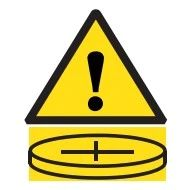
If the product is too small to display the above label or icon, the product packaging or tag label must meet the above requirements.
IV. Instruction Manual Requirements
The instructions and manuals provided shall include all applicable markings from the above sections and the following instructions. If instructions and manuals are not provided, this information shall be on the main or secondary panel of the consumer product box. If there is no box, it shall be on the accompanying tag or label.
a) "Remove and immediately recycle or dispose of used batteries in accordance with local regulations, keeping away from children. Do not discard batteries in household trash or incinerators."
b) "Even used batteries can cause serious injury or even death."
c) "Call your local poison control center for treatment information."
d) Indicate compatible battery types (e.g., LR44, CR2032).
e) Nominal battery voltage.
f) "Non-rechargeable batteries must not be charged."
g) "Do not force discharge, charge, disassemble, heat above (rated temperature specified by the manufacturer), or incinerate. Doing so may result in personal injury and chemical burns from venting, leakage, or explosion."
Products containing replaceable button batteries should also include the following statements:
a) "Make sure to install the battery correctly according to the polarity (+ and -)."
b) "Do not mix old and new batteries, batteries of different brands or types, such as alkaline batteries, carbon-zinc batteries, or rechargeable batteries."
c) "Remove and immediately recycle or dispose of batteries from equipment that has not been used for an extended period of time according to local regulations."
d) "Always fully secure the battery compartment. If the battery compartment cannot be securely closed, stop using the product, remove the battery, and keep it away from children."
Products with non-replaceable button batteries should also include a statement indicating that the product contains a non-replaceable battery.
Email:hello@jjrlab.com
Write your message here and send it to us
 ASTM D4169 Drop Test
ASTM D4169 Drop Test
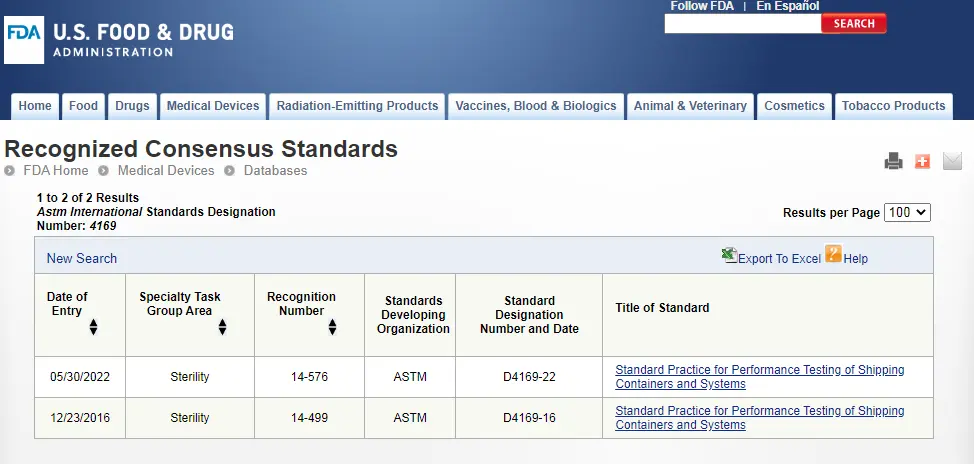 ASTM D4169 Packaging Simulation Transportation Tes
ASTM D4169 Packaging Simulation Transportation Tes
 What is ASTM D4169 Testing?
What is ASTM D4169 Testing?
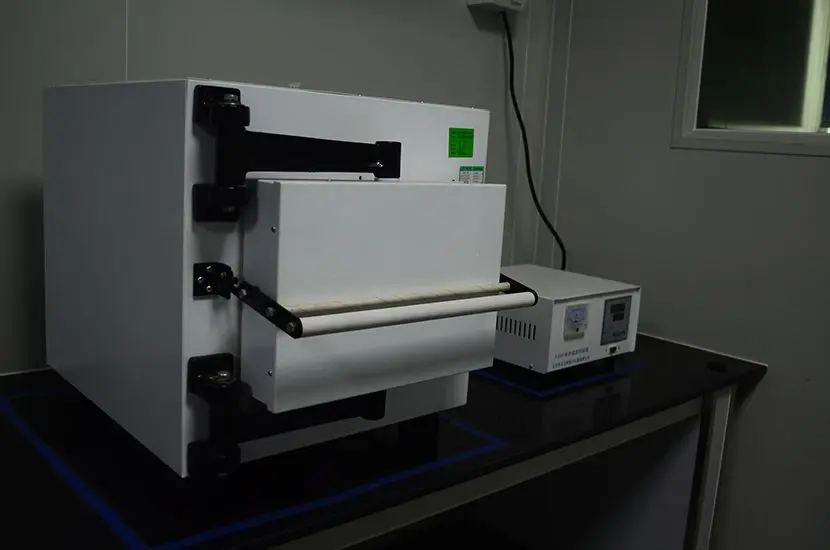 ASTM D4169-23 Test Standard Revision
ASTM D4169-23 Test Standard Revision
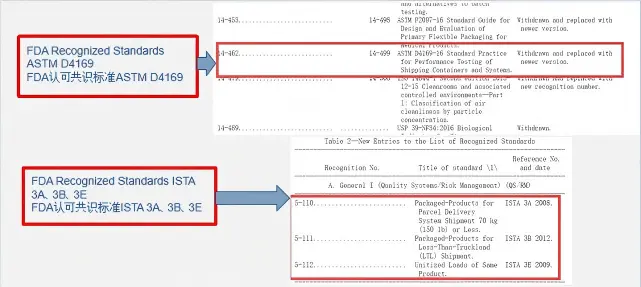 Transport Simulation Testing for Medical Device Pa
Transport Simulation Testing for Medical Device Pa
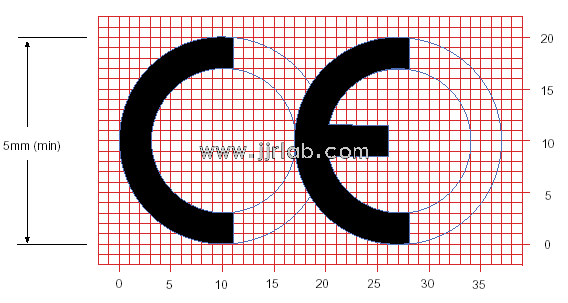 EU CE Certification Guidelines for Lighting Fixtur
EU CE Certification Guidelines for Lighting Fixtur
 Lithium Battery Export: CB Certification & IEC
Lithium Battery Export: CB Certification & IEC
 How to Apply for One FCC Certificate for Multiple
How to Apply for One FCC Certificate for Multiple
Leave us a message
24-hour online customer service at any time to respond, so that you worry!




